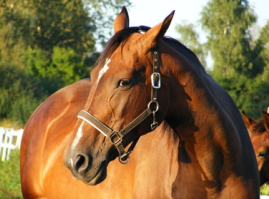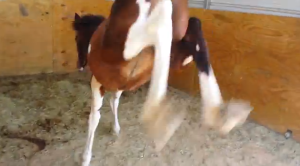 You’ve purchased a horse and you’re crazy about him, despite the fact that he has a difficult temperament. You say he’s got “spunk.” Others say he’s just downright nasty. But what does it matter, what others think—he’s your problem, right? That may be so, unless someone gets injured. Then you may have a bigger problem on your hands than just his challenging temperament.
You’ve purchased a horse and you’re crazy about him, despite the fact that he has a difficult temperament. You say he’s got “spunk.” Others say he’s just downright nasty. But what does it matter, what others think—he’s your problem, right? That may be so, unless someone gets injured. Then you may have a bigger problem on your hands than just his challenging temperament.
As you may know, under the law, homeowners generally have a duty to exercise reasonable care to make sure those invited onto their property are safe. For the most part, as an owner or occupier of property, you should take reasonable steps to ensure that the condition of the property, the activities taking place there, and the conduct of others on your property won’t endanger your guests and others lawfully present. In legal terms, this is called the “negligence” standard. This duty also extends to any animals you keep on your property, including horses.
Domesticated horses are not considered inherently dangerous. Therefore, in most instances, if a guest on your property is injured because of your horse, if he wants to make a claim against you for those injuries, he has the burden of showing that you were negligent, i.e. that you somehow failed in your duty to exercise reasonable care. So, for instance, your friend comes over for a ride on your horse. You fail to put the saddle on securely and she falls off, injuring herself. She may have a claim against you for the injuries since you did not exercise reasonable care in putting the saddle on the horse.
On the other hand, let’s say while you’re in the tack room getting the saddle, your friend goes around to the back of your horse to have a closer look at his tail. The horse kicks and your friend is injured. She may have a hard time proving that you breached any duty since it is commonly known that horses, by their nature, will kick, and you didn’t necessarily violate any duty of care.
There is, however, one important exception to this negligence standard that all horse owners must be aware of. It is a concept known as “strict liability.”
Basically, under the doctrine of strict liability, if you know that your horse (or any other domesticated animal that you own) has dangerous propensities, you may be liable for any injuries caused by your horse without the injured person having to prove that you breached a duty. In other words, the actions of the dangerous animal are proof enough.
So, in the example above, suppose you invite your friend over for a ride on your ill-tempered horse, which horse has a history of biting. Your friend tries to pet the horse, and he bites her, seriously injuring her hand. Your friend may sue you for the injuries on a theory of strict liability, without having to show that you failed to act in a reasonable manner.
While the details may vary from state to state, for strict liability to apply, the injured person needs to show that (a) the harm inflicted by the animal was a result of known dangerous propensities (b) that such behavior is not normal for that type of animal; and (c) the injury was a result of the dangerous propensity.
 The question often centers on what is considered a “dangerous propensity.” In other words, what is atypical, dangerous behavior for a horse, and what isn’t? For the most part, this question needs to be determined on a case-by-case basis and is dependent on the particular facts and circumstances of each particular incident. Still, most courts recognize that while some degree of kicking and even nipping may be expected of a horse, “in-your-face” aggressive tendencies such as hard biting, deliberate and consistent charging, destructive kicking, intractable bucking, or rearing or bolting while under saddle are generally considered “dangerous propensities” when arguing strict liability.
The question often centers on what is considered a “dangerous propensity.” In other words, what is atypical, dangerous behavior for a horse, and what isn’t? For the most part, this question needs to be determined on a case-by-case basis and is dependent on the particular facts and circumstances of each particular incident. Still, most courts recognize that while some degree of kicking and even nipping may be expected of a horse, “in-your-face” aggressive tendencies such as hard biting, deliberate and consistent charging, destructive kicking, intractable bucking, or rearing or bolting while under saddle are generally considered “dangerous propensities” when arguing strict liability.
Under the law, horses are defined as “livestock” and, as such are considered “domesticated animals,” like sheep, cows, or chickens. However, since they are also commonly considered to be pets by their owners, the Courts, when considering dangerous propensities, view them more in line with dogs or cats. The owners are expected to be more familiar with the temperament and behavior of their animal, and are generally held to a higher standard in that regard. Therefore, while a farmer may reasonably argue that he had no clue that one of his five cows had a dangerous disposition, the owner of a horse will not likely get away with such a claim.
Considering the types of behaviors noted above regarded as dangerous for a horse, it would be hard for an owner to ignore these tendencies or claim they had no knowledge of them. This is especially true if the horse’s behavior has been documented (i.e. usually through vet records, past owners, show history, breeding records, or even sales documentation).
Strict liability is sometimes referred to as “absolute liability,” and the name certainly fits. Unlike negligence cases, the defenses that can be raised are very limited. Even if a horse owner exercised reasonable care in protecting a guest against a dangerous animal, strict liability generally still applies. Some jurisdictions will allow a horse owner to argue “assumption of risk,” saying basically that the injured person knew of the dangers and voluntarily took on the risks, but this defense not always act as a bar to liability.
 Similarly, in some instances, when sued under a theory of strict liability, a horse owner can claim contributory negligence, maintaining claiming that the injured person knowingly and unreasonably subjected themselves to the dangers posed by the animal by their own behavior. So, for instance, if your friend intentionally taunts your horse and gets bitten, contributory negligence may apply. However, this argument will typically not bar recovery unless the actions of the injured person were blatantly unreasonable and intentional.
Similarly, in some instances, when sued under a theory of strict liability, a horse owner can claim contributory negligence, maintaining claiming that the injured person knowingly and unreasonably subjected themselves to the dangers posed by the animal by their own behavior. So, for instance, if your friend intentionally taunts your horse and gets bitten, contributory negligence may apply. However, this argument will typically not bar recovery unless the actions of the injured person were blatantly unreasonable and intentional.
In many jurisdictions, if a person’s actions contributed to their own injuries, the owner of the offending animal can argue comparative fault. Again, this argument will not exonerate a horse owner from liability, but instead, it might help reduce the amount of the monetary recovery based upon the percentage of fault of the injured person.
While strict liability cases are not common, they do occur. The reason strict liability cases are rare is because many states have a statutory scheme immunizing certain equine activities. As a horse owner, to protect yourself, not only do you need to know your horse, but you need to be perfectly honest with others about your horse’s behavior. If you harbor any doubts about your horse’s disposition and temperament, don’t take chances. Show your guests a picture instead.
Mati Jarve is the managing partner of the Marlton, New Jersey law firm of Jarve Kaplan Granato, LLC. He is certified by the New Jersey Supreme Court as a Civil Trial Attorney and theNational Board of Trial Attorneys as a Trial Advocate. Licensed in New Jersey, Pennsylvania and Arizona, he maintains a national practice in civil litigation, including equine related issues. This article is for informational purposes only and is not intended to be legal advice. If you have a specific legal question or problem you should consult with an experienced and knowledgeable equine law attorney. Questions, comments or suggestions can be e-mailed to mjarve@nj-triallawyers.com, by visiting www.njtriallawyers.com.



You must be logged in to post a comment Login